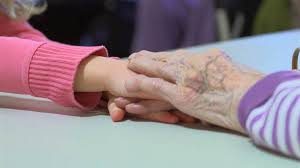
Preschools are being seen more and more often in Nursing Homes and Skilled Nursing Facilities around the country.
What is intergenerational programming?
Intergenerational means that there are two or more generations being combined and programming in this scenario means including some sort of activity with meaning in it. They will share knowledge, meaning, and experiences which allows for the two groups to learn from each other. The National Councilor on Aging ads that the experiences are mutually beneficial, meet some needs of each generation, and foster growth, understanding, and friendship.

True or False: Children always view their elders positively:
FALSE: Children often associate the elderly population with illness and death. By incorporating the two populations, there is a new understanding and perception of the elderly. More recent trends have noticed that children do not spend as much time with their grandparents and great grandparents. The traditional intergenerational composition of families has become lost as families live farther apart from each other, and our primarily age-segregated society provides very little opportunity for intergenerational interaction.
Program Design Method
- Knowledge and understanding of human growth
- Developmentally appropriate practice and support for both the children and elders
- Consideration of cultures
- Respect for all ages
- Input from all people involved

True or False: Children can decrease depression rates in adults?
TRUE!! The innocence of a child can bring joy to anyone. The elderly feel better knowing they will be seeing the children and feel more relaxed. Many say they forget their age and have increased levels of energy and get good exercise from the children. It is therapeutic physically and mentally
. 
References
Foster, K. B. (1997). Intergenerational Programming: The Impact on Children and Elders.
Holmes, C. L. (2009). An Intergenerational Program with Benefits. Early Childhood Education Journal, 37(2), 113-119.
Low, L., Russell, F., McDonald, T., & Kauffman, A. (2015). Grandfriends, an Intergenerational Program for Nursing-Home Residents and Preschoolers: A Randomized Trial. Journal Of Intergenerational Relationships, 13(3), 227-240. doi:10.1080/15350770.2015.1067130
Morita, K., & Kobayashi, M. (2013). Interactive programs with preschool children bring smiles and conversation to older adults: time-sampling study. BMC Geriatrics, 13(1), 111. doi:10.1186/1471-2318-13-111
